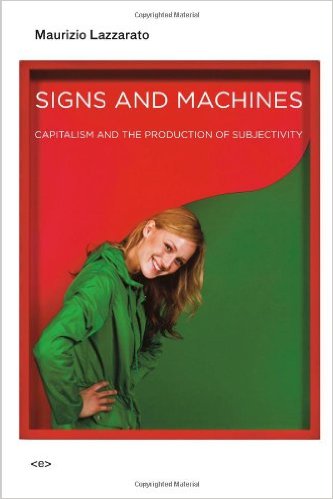
SIGNS AND MACHINES
Capitalism and the Production og Subjectivity
Subjectification (French: subjectivation) is a philosophical concept coined by Michel Foucault and elaborated by Gilles Deleuze and Félix Guattari. It refers to the construction of the individual subject. The concept has been often used in critical theory, sometimes with Louis Althusser’s concept of interpellation. In Gilbert Simondon’s theory of individuation, subjectification precedes the subject in the same way as the process of individuation precedes the creation of the individual. While the classical notion of a subject considers it as a term, Foucault considered the process of subjectification to have an ontological pre-eminence on the subject as a term.
One can be ‘enslaved’ or ‘subjected’ to a machine (whether it be technical, social, communicational, etc.) We are enslaved to a machine when we are a cog in the wheels, one of the constituent parts enabling the machine to function. We are subjected to the machine when, constituted as its users, we are defined purely by the actions that use of the machine demands. Subjection operates at the molar level of the individual (its social dimension, the roles, functions, representations and affections). Enslavement on the other hand operates at the molecular (or pre-individual or infrasocial) level (affects, sensations, desires, those relationships not yet individuated or assigned to a subject). I will try to illustrate the features that characterize these devices of enslavement and subjection, by examining how they function in the television “machine”.
The most influential book of the past seventy-five years: a groundbreaking exploration of everything we know about what we don’t know, now with a new . . .
«Kanskje finnes det for latteren ennå en fremtid!», skriver Nietzsche i åpningen av Den muntre vitenskapen. Med satire og skarpe iakttakelser legger han blant annet . . .
Hvorfor gjør vi feil? Og hvorfor i all verden fortsetter vi å gjøre de samme feilene gang på gang? Vi tenker i ett av to . . .
«The planet is sick. Human beings are guilty of damaging it. We have to pay. Today, that is the orthodoxy throughout the Western world. Distrust . . .
Virilio’s exploration of the relationship between technology, war and information technology. “Civilization or the militarization of science?” With this typically hyperbolic and provocative question as . . .
With this book Paul Virilio inaugurated the new science whose object of study is the «dromocratic» revolution. Speed and Politics (first published in France in . . .
The Believing Brain is bestselling author Michael Shermer’s comprehensive and provocative theory on how beliefs are born, formed, reinforced, challenged, changed, and extinguishedSynthesizing thirty years . . .
«Verden er min forestilling.» Med denne påstanden innleder Schopenhauer sitt hovedverk fra 1818. Alt som kan erkjennes, er objekt for et subjekt. Omvendt gjelder det . . .
Michel Foucault takes us into the first two centuries of our own era, into the Golden Age of Rome, to reveal a subtle but decisive . . .
In this sequel to The History of Sexuality, Volume I: An Introduction, the brilliantly original French thinker who died in 1984 gives an analysis of . . .
Michel Foucault offers an iconoclastic exploration of why we feel compelled to continually analyze and discuss sex, and of the social and mental mechanisms of . . .
There is a catastrophe within contemporary art. What I call the «optically correct» is at stake. The vision machine and the motor have triggered it, . . .
“One day the day will come when the day will not come.” Bleak in its analysis of the social destruction wrought by modern technologies of . . .
Massive technological innovations now allow scientists to extract and analyze ancient DNA as never before, and it has become clear–in part from David Reich’s own . . .
‘Hinsides godt og ondt’ er en hyllest til livet og kreativiteten og på mange måter et endelig farvel med metafysikken. I åpningen sier Nietzsche at . . .
Taboo and sacrifice, transgression and language, death and sensuality—Georges Bataille pursues these themes with an original, often startling perspective. He challenges any single discourse on . . .
How would it be if what we take for human advance were simply a technological progress that literally leaves us out of its equations? What . . .
A trenchant critique of new techniques of waging war, and its reduction to images on a screen Written with his characteristic flair, Virilio’s latest book . . .
With around 645 million people expected to be displaced Ð by wars and other catastrophes Ð by 2050, Virilio begins The Futurism of the Instant . . .
The underlying premise of all of Virilio’s work is that we must analyzespeed and acceleration throughout history and see it as constitutive of historicalepochs. Continual . . .